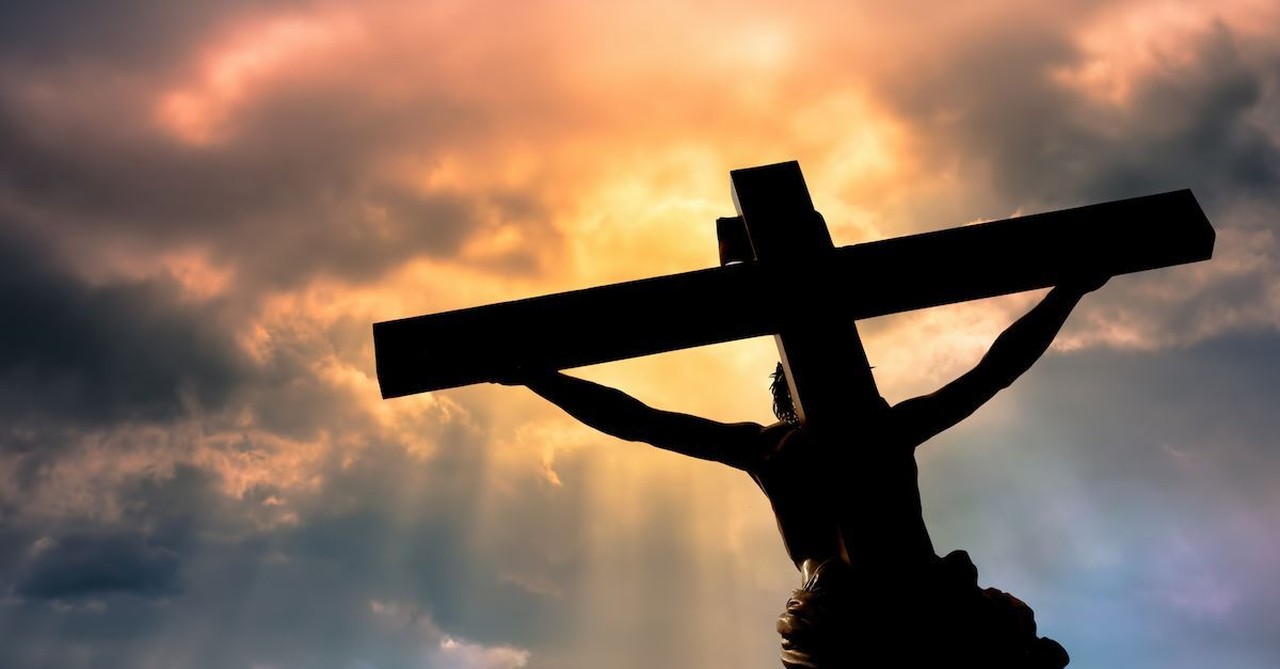The Holy Week - What Is the Significance of the 8 Days of Easter?

Holy Week spans from Palm Sunday to Easter Sunday. Do you know what happened on the days leading up to the crucifixion and after? Russ Ramsey, pastor and author, has written a helpful article for The Gospel Coalition titled “Easter Week in Real Time.”
When we celebrate Christmas there is a merrier tone, but when we celebrate Easter (though we should be glad in our hearts) there should be a more serious tone. We need to understand the cost of our happiness and the great sacrifice that made it possible.
Following is the Holy Week, the eight days of Easter, explained in more detail. This will hopefully help your observance of Easter be more meaningful this year.
Get your FREE 8-Day Prayer and Scripture Guide - Praying Through the Holy Week HERE. Print your own copy for a beautiful daily devotional leading up to Easter.
Photo courtesy: ©Getty Images/udra
1. Palm Sunday - A Triumphal Entry and Beginning of The Holy Week

1. Palm Sunday - A Triumphal Entry and Beginning of The Holy Week
SLIDE 1 OF 8
The events of Palm Sunday are found in Matthew 21:1-11, Mark 11:1-11, Luke 19:28-44, and John 12:9-19.
Many churches celebrate Palm Sunday, which is the Sunday before Easter; maybe your church had children waving palm branches to help them connect to the story. But while this is a triumphal entry, it is also Jesus’ first step toward His death.
Matthew 21:4 tells us:
“This took place to fulfill what was spoken by the prophet, saying, "Say to the daughter of Zion, 'Behold, your king is coming to you, humble, and mounted on a donkey, and on a colt, the foal of a beast of burden.'" *The prophecy is cited from Zechariah 9:9 and Isaiah 62:11.
Ramsey writes,
“When Jesus rode into Jerusalem perched on a colt, it was the first time since raising Lazarus from the dead that he’d shown his face in the city.”
Jesus had become somewhat of a celebrity among people who had heard of the miraculous raising of Lazarus from the dead, and they wanted to see Him and treat Him like a king. But Jesus wasn’t arriving to be their king on account of Lazarus; the story of Lazarus would have had the religious leaders in even more of an uproar and determined to put an end to His life, which He knew ... Jesus’ glory would be greater than that of a local king.
Photo Credit: ©Thinkstock/bkkm
Day 2: The Monday before Easter - Turning the Tables

Day 2: The Monday before Easter - Turning the Tables
SLIDE 2 OF 8
The events for the Monday before Easter are recorded in Matthew 21:12-22, Mark 11:12-19, and Luke 19:45-48.
Ramsey describes Jerusalem as a beehive, and the triumphal entry was like hitting that angry hive with a stick. If some of the people weren’t angry enough at Jesus’ entry to the city, He would now declare to them their failure to live up to God’s covenant with them. But Jesus was already a marked man as Ramsey remarks.
This is the Monday when Jesus entered the temples and drove out all those who bought and sold things there. Matthew tells us that even upon seeing the wondrous things Jesus did and hearing the children cry out “Hosanna to the Son of David!” the chief priests and scribes were indignant. Their hearts and minds were made up about this man whom they considered the biggest nuisance to ever enter Jerusalem.
But Jesus responds to His disciples’ awe with Scripture from Psalm 8:2,
"...'have you never read,' 'Out of the mouth of infants and nursing babies you have prepared praise'?" – Matthew 21:16
Ramsey summarizes, “Much of what the Gospels tell us about Monday centers on the theme of Jesus’s authority—both over the created world and his right to judge it.” Jesus is fulfilling all of the Scriptures; He is the one with the authority in this situation not the religious leaders.
Photo Credit: ©Thinkstock/Matthew Brousseau
Day 3: The Tuesday before Easter - Teaching in the Temple

Day 3: The Tuesday before Easter - Teaching in the Temple
SLIDE 3 OF 8
The events of the Tuesday before Easter are recorded in Matthew 21:23-26:5, Mark 11:27-14:2, Luke 20:1-22:2, and John 12:37-50.
Jesus spent Tuesday teaching God’s Word in the temple to all who would listen; “But Tuesday afternoon is the last time Jesus publicly teaches in the temple as a free man. His words on this day are his closing argument, his manifesto,” writes Ramsey.
In Matthew 26:1-5 Jesus tells His disciples:
"You know that after two days the Passover is coming, and the Son of Man will be delivered up to be crucified." Then the chief priests and the elders of the people gathered in the palace of the high priest, whose name was Caiaphas, and plotted together in order to arrest Jesus by stealth and kill him. But they said, "Not during the feast, lest there be an uproar among the people."
Ramsey explains, “If Monday’s arrival in the temple was an all-inclusive, living parable of cleansing God’s house, Tuesday’s entrance is a direct, verbal confrontation with the appointed leadership.” And as we read in the gospels, the appointed leadership did not take it well.
Photo Credit: ©Thinkstock/FotoDuets
Day 4: The Wednesday before Easter - A Day of Rest

Day 4: The Wednesday before Easter - A Day of Rest
SLIDE 4 OF 8
The events of the Wednesday before Easter are recorded in Matthew 26:6-16, Mark 14:3-11, and Luke 22:3-6.
On Wednesday Jesus rested; He allowed a woman to pour expensive ointment on His head. When His disciples exclaimed at the price of the oil and what they considered a waste, Jesus responded,
“For you always have the poor with you, and whenever you want, you can do good for them. But you will not always have me. She has done what she could; she has anointed my body beforehand for burial.” -Mark 14:7-8
The Gospel Transformation Bible notes, “The woman’s extravagant generosity in pouring out her ‘very expensive ointment’ on Jesus stands in stark contrast to the greed that drove Judas to betray Jesus for thirty pieces of silver. The condition of one’s heart will reveal itself in one’s actions.”
For thirty pieces of silver, Judas gave over a life. In Zechariah 11:12 we also see the price of thirty pieces of silver. The NIV Biblical Theology Study Bible reminds us that this was the price of a slave as cited in Ex. 21:32; D.A. Carson, the general editor, continues, “This payoff is an insult that utterly rejects God as shepherd . . . Matthew sees this same scenario of rejecting God played out again when Judas betrays Jesus, the Good Shepherd for 30 pieces of silver.”
Photo Credit: ©Thinkstock/Brian A. Jackson
Day 5: Maundy Thursday - From the Latin "Mandatum" Translated “Commandment”

Day 5: Maundy Thursday - From the Latin "Mandatum" Translated “Commandment”
SLIDE 5 OF 8
The events of Maundy Thursday are recorded in Matthew 26:17-75, Mark 14:12-72, Luke 22:7-71, and
Maundy Thursday covers the washing of the disciples’ feet, the announcement of Jesus' coming betrayal, the Passover meal, prayer at the Mount of Olives, and ultimately His arrest in Gethsemane. As Ramsey comments, Jesus isn’t just there to pray at the Mount of Olives . . . He is there to wait. He knows what’s coming, He has been waiting for it, and He is ready to fulfill His promise.
“But the Scripture will be fulfilled, 'He who ate my bread has lifted his heel against me.' I am telling you this now, before it takes place, that when it does take place you may believe that I am he. Truly, truly, I say to you, whoever receives the one I send receives me, and whoever receives me receives the one who sent me." *The Scripture is Psalm 41:9
Later this night the Sanhedrine met to decide Jesus’ fate, and they called for His death.
Photo Credit: ©Thinkstock/artisteer
Day 6: Good Friday - The Son of Man Has Come to Die

Day 6: Good Friday - The Son of Man Has Come to Die
SLIDE 6 OF 8
The events of Good Friday are recorded in Matthew 27:1-61, Mark 15:1-47, Luke 23:1-56, and
Today is the day Jesus was delivered over to Pilate the governor of Judaea. When Pilate asked Jesus if He was King of the Jews, He responded that Pilate had said so. Still, Pilate believed Jesus had done nothing deserving of death and tried to free Him by asking the people which prisoner they wanted released (as was custom)—but the people shouted Barabbas.
Even at the urging of his wife not to harm this man because of a dream she had, Pilate continued on in the death proceedings. Jesus was beaten, mocked, and crucified—but there was something different about His death.
Mark 15:37-39 states,
“And Jesus uttered a loud cry and breathed his last. And the curtain of the temple was torn in two, from top to bottom. And when the centurion, who stood facing him, saw that in this way he breathed his last, he said, 'Truly this man was the Son of God!'”
Ramsey expresses,
“Never before or since has more been lost and gained at the same time. The world gained the atoning sacrifice of Christ. But for those present, either the significance of the moment is lost on them or their hearts break as the One they thought to be the Savior of the world dies at the hands of Rome. They can’t stop it, and they don’t realize it’s for them. They hoped in him, and though he’d told them he would suffer many things and rise three days later (Mark 8:31), how could they have possibly known this was what he meant?“
Photo Credit: ©GettyImages/mbolina
Day 7: Holy Saturday - Jesus’ Body Lay Dead in the Tomb

Day 7: Holy Saturday - Jesus’ Body Lay Dead in the Tomb
SLIDE 7 OF 8
Matthew 27:62-66 reveals:
“The next day, that is, after the day of Preparation, the chief priests and the Pharisees gathered before Pilate and said, "Sir, we remember how that impostor said, while he was still alive, 'After three days I will rise. 'Therefore order the tomb to be made secure until the third day, lest his disciples go and steal him away and tell the people, 'He has risen from the dead,' and the last fraud will be worse than the first." Pilate said to them, "You have a guard of soldiers. Go, make it as secure as you can." So they went and made the tomb secure by sealing the stone and setting a guard.”
Less is written about this day in Scripture than any other day in Holy Week, but this is the only full day where Jesus’ body lay buried. As Ramsey writes, the chief priests may have scoffed at Jesus’ prophecy but they did not forget it. The religious leaders were paranoid that something might happen still, which is why they asked for the extra security.
Photo credit: ©GettyImages/RomoloTavani
Day 8: Resurrection Sunday - He Is Risen Indeed!

Day 8: Resurrection Sunday - He Is Risen Indeed!
SLIDE 8 OF 8
The events of Resurrection Sunday are recorded in Matthew 28:1-20, Mark 16:1-8, Luke 24:1-53, and
Some of the women disciples went to the tomb to prepare Jesus’ body with burial spices and oils, but they found that the stone had been rolled away and the body was missing. Luke 24:4-8 tells us,
“While they were perplexed about this, behold, two men stood by them in dazzling apparel. And as they were frightened and bowed their faces to the ground, the men said to them, "Why do you seek the living among the dead? He is not here, but has risen. Remember how he told you, while he was still in Galilee, that the Son of Man must be delivered into the hands of sinful men and be crucified and on the third day rise." And they remembered his words, and returning from the tomb they told all these things to the eleven and to all the rest.”
He was not there. He is risen! But Jesus wasn’t a martyr for a cause as Ramsey explains, “No one took his life from him. He laid it down. For whom? For his flock, his people.” He continues,
“Easter says of Jesus, ‘He meant it! He meant to lay down his life for you. And as surely as he has taken it up again, he knows you and loves you.’”
To read Russ Ramsey's article in its entirety please visit TheGospelCoalition.org.
The life, death, and resurrection of Jesus was not an accident, it was full of purpose for God’s glory and our salvation.
Reflect on these eight days of Easter during this year's Holy Week, and read the Scriptures prayerfully with purpose. Share this wonderful truth with your family and friends as you prepare for Easter.
Based on the article "The 8 Days of Easter: What You Need to Know."
Photo credit: ©GettyImages/Boonyachoat
Originally published April 13, 2022.






